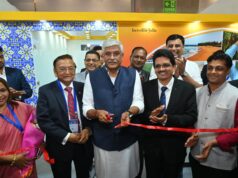Goa Tourism is adopting a model of regenerative tourism, the Tourism Minister Rohan Khaunte announced on Wednesday.
This innovative approach aims to redefine the tourism industry in India by promoting environmental restoration, cultural preservation, and community empowerment by means of the four paths of spirituality, indigeneity, civilisational and cultural nationalism and conscious tourism.
“With the launch of the Ekadasha Teertha, we are giving Indian tourism a fresh look with an emphasis on spirituality, indigeneity, cultural and civilisational nationalism, and conscious tourism.
“Through travel and pilgrimage, the Indian people have expanded their geographical knowledge throughout millennia, freeing themselves from the constraints of regionalism and parochialism. We are committed to making a positive difference in the environment, culture, and communities we interact with, and this is reflected in our support of regenerative tourism in Goa. Our goal in introducing this model is to encourage the travel and tourism sector to adopt sustainable practices that benefit both the environment and human population,” said Khaunte.
The United Nations’ World Tourism Organization defines Regenerative Tourism as “tourism that takes full account of its current and future economic, social and environmental impacts, addressing the needs of visitors, the industry, the environment and host communities”.
The Ekadasha Teertha are spiritual sites to be decided by the Department of Tourism in consultation with the communities around these sites.
“The key is to develop mutual respect and appreciation between the visitors and the hosts. We are all involved in this project and it is important to have a sense of ownership over and investment in each other and the planet. Our focus is to build communities. We are in advanced talks with entrepreneurs and innovators in the tourism sector to help local women and youth get first-hand experience on becoming commercial partners in the Ekadasha Teertha endeavour,” said Suneel Anchipaka, IAS Director, Tourism & Managing Director, GTDC.
In the decades following liberation, Goa strategically embraced tourism, leveraging its historical global connections and scenic beaches for economic growth. This led to the acquisition of distinctive attributes, positioning Goa as a gateway to and from India to the globe.
“Facing unique challenges, including competition from countries like Thailand and Indonesia, modern cities like Kuala Lumpur and Bangkok, and large Indian states, Goa has set its sights on innovative solutions post-COVID.
Emphasising technology adoption and collaboration, the focus is on making people and communities decision-makers in the tourism sector,” Khaunte said adding that Goa is transitioning from a seashore-centric tourism model to a more inclusive, people-centric approach. The impact of climate change and democratization calls for a paradigm shift beyond sustainability towards regenerative tourism.
According to Anchipaka, “The introduction of the new tourism policy in 2020 reflected a commitment to cultural immersion. The emphasis on homestays, run by local families within communities, allows visitors to engage with the authentic culture, lifestyle, and values of the place.”
“We envisage a future where tourists and hosts are equal players, determining the destiny not just of Goa and India but of the Earth itself. This shift empowers local communities and fosters a shared experience between hosts and tourists,” Khaunte asserted.
Watch the press briefing 👇






